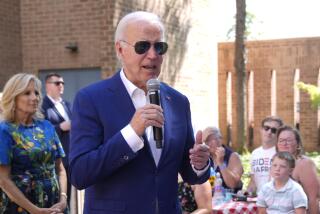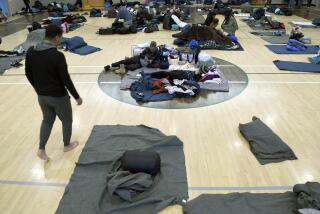Clinton to Seek Relief for Cities From Federal Edicts
- Share via
WASHINGTON — Saying that he regrets his inability to do more for struggling cities, President Clinton told 200 mayors Tuesday that he will seek relief for them from federal mandates that require state and local governments to carry out expensive programs without providing the money to pay for them.
Speaking over closed-circuit television to the annual national mayors conference in New York City, Clinton said he will review legislation that would halt the federal practice of mandating unfunded programs.
The pledge comes at a time when the growing federal deficit has forced the Administration to scale back its plans for new urban programs.
“I am determined to establish a new relationship, a new partnership with our nation’s cities based on respect and responsibility and an understanding that you ought to have more flexibility to do your work without so much micromanagement and regulation from the national government,” Clinton told the mayors.
Later, he added: “I have told our Administration clearly that I don’t want us . . . supporting bills (that) load up a bunch of new burdens on the mayors and the governors when they’re broke, when we’re not increasing funding to the states and cities, as we should.”
Federal mandates, in such areas as clean water and access for the disabled, for example, have become a major issue for cash-strapped mayors. They complain that more and more demands are being placed on the cities by the federal government, while aid has been cut.
“Unfunded mandates dictate that the city of New York must raise billions in tax money to cover the things the federal government says we must do,” New York Mayor David N. Dinkins said during a closing news conference.
Dinkins said a quick count showed that New York would have to spend $715 million over five years to meet the requirements of the Americans With Disabilities Act alone. The mayors organization is planning a nationwide study to determine the costs forced on local governments by federally mandated programs.
Clinton commiserated with the mayors over the inability of his Administration to do more to help ease the cities’ plight.
“I think all of you understand that, because of the massive debt we inherited, I can’t do everything that I want to do,” he said.
He also thanked them for their support for his $16.3-billion stimulus plan, which was defeated by Congress earlier this year. The plan would have given cities money for housing, summer school classes for poor children and summer jobs for youth, while creating new jobs.
Some of the programs the Administration is continuing to push are being criticized by urban liberals, who say they will have only a superficial impact on a few cities.
Clinton’s empowerment zone proposal, for instance, would direct $5 billion to be used to attract businesses and create jobs--but only six cities will be chosen for the special program.
“It’s not a program or approach that people treat seriously,” said Richard Bradley, president of the International Downtown Assn., which works to invigorate urban areas. “It’s not a bad idea--it’s a small idea.”
In another program that falls short of urban officials’ expectations, the Administration plans to spend only $75 million to address the problem of violence in schools, which last year resulted in 3 million violent crimes and thefts.
As with many of the Administration’s proposals, the funds will be given to states and communities that design their own programs for handling the problem and can come up with matching funds.
More to Read
Sign up for Essential California
The most important California stories and recommendations in your inbox every morning.
You may occasionally receive promotional content from the Los Angeles Times.










